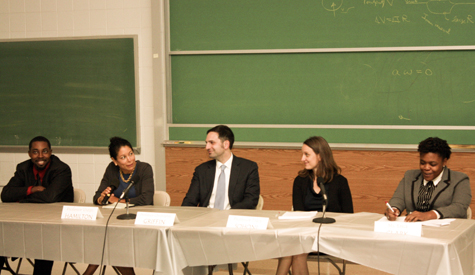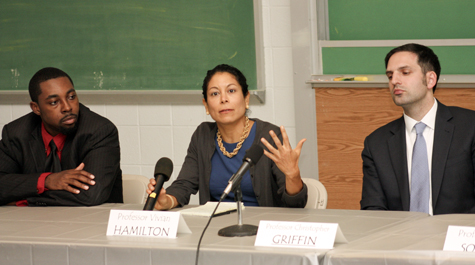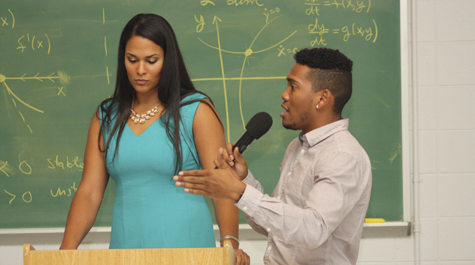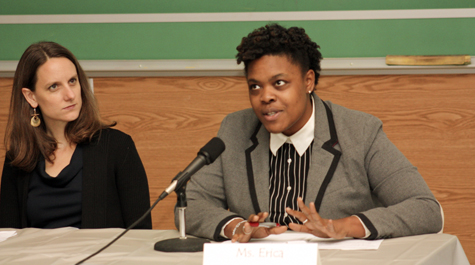Black Law Students Association Hosts Movie Night and Panel Discussion on Fruitvale Station
On Thursday, Oct. 16, William & Mary Law School’s Black Law Students Association (BLSA) sponsored a screening of the award-winning film Fruitvale Station, followed by a panel discussion with students, friends, and faculty of the Law School and the wider William & Mary community.
Fruitvale Station tells the story of Oscar Grant, a 22-year-old African-American man who died from a gunshot wound sustained while being detained by Bay Area Rapid Transit (BART) police officers in the early morning hours of New Year’s Day 2009 at the Fruitvale BART station in Oakland, Calif. Grant’s shooting and the subsequent trial of the police officer who fired the fatal shot garnered national attention and sparked numerous protests in Oakland. The officer was convicted of involuntary manslaughter and given the minimum two-year sentence.
Among BLSA members participating in the film screening were Michael Roy J.D. ’15 and Claire Wheeler J.D. ’15, who moderated the panel discussion. Erica Clark J.D. ’15, who is the National Director of Community Service for the National Black Law Students Association, served as a panelist. Belema Idoniboye J.D. ’15 organized the event.
Before the screening, National Endowment for the Humanities Professor Michael Blakey of William & Mary’s Department of Anthropology offered an overview of the history and anthropology of racism. Blakey also spoke about the state of racism in contemporary American society and its role in events like Oscar Grant’s death.
Joining Erica Clark on the panel were Professor of Law Vivian Hamilton, Assistant Professor of Law Christopher Griffin, Assistant Professor of Sociology Tracy Sohoni, and Travis Harris, Ph.D. candidate in American Studies and graduate assistant for The Lemon Project.
Panel topics included Harris’s recent trip to Ferguson, Mo., and the demonstrations there in the wake of the Michael Brown shooting; the presentation of African-American victims and their families in the media after events like the Brown shooting; and the use of empirical data to identify racial bias in the criminal justice system.
After the event, Idoniboye noted that the most obvious and unfortunate tragedies of Fruitvale Station are that the film is based on a true story and that incidents of police brutality, such as the one portrayed in the film, occur at a disturbingly alarming rate.
“Sadly, stories like Oscar Grant’s continue to occur, in some manifestation, far too often in American society,” Idoniboye said. “Through tonight’s screening of Fruitvale Station and the lectures and insights provided by some of the College’s brightest minds, BLSA aimed to foster an open, supportive Tribe community by shining a light on these tragic incidents that have sparked a myriad of emotions and responses including outrage, activism, and, even hopelessness, among large segments of the country.”
“Tonight, attendees were able to watch, learn and engage in an open and critical conversation about structural racism, police brutality, and social justice activism,” Idoniboye added. “It was very inspiring to see attendees leave tonight’s event with a deeper understanding of the roles they can play in promoting social justice and racial understanding within their respective communities.”
BLSA hosts its next event on Oct. 30 in collaboration with the Law School’s Lewis B. Puller, Jr. Veterans Benefits Clinic. The Honorable Will A. Gunn will speak about his experiences as former General Counsel for the U.S. Department of Veterans Affairs and as the first-ever Chief Defense Counsel for the Guantanamo Bay detainees. The event begins at 12:50 p.m. in Room 127 of the Law School.
About William & Mary Law School
Thomas Jefferson founded William & Mary Law School in 1779 to train leaders for the new nation. Now in its third century, America's oldest law school continues its historic mission of educating citizen lawyers who are prepared both to lead and to serve.



